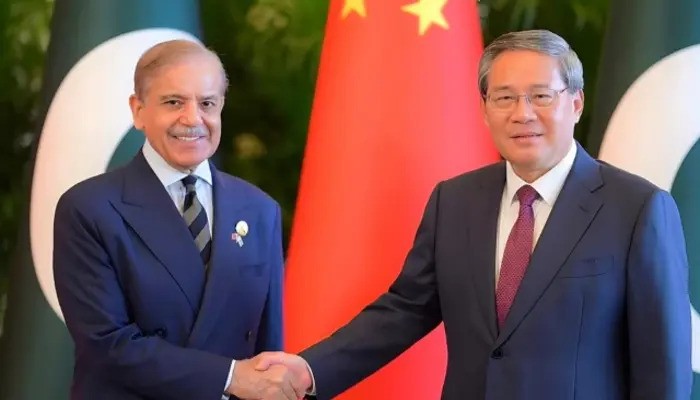ISLAMABAD: Prime Minister Shehbaz Sharif assured Chinese investors of smooth procedures and full facilitation as Pakistan and China signed $4.2 billion worth of agreements to boost business-to-business (B2B) cooperation across multiple sectors.
The deals, covering agriculture, industry, health, trade, mining, and minerals, were signed at the second Pakistan-China B2B Investment Conference in Beijing on Thursday. State media reported that 21 memorandums of understanding (MoUs) and joint ventures were finalized, marking a significant step in deepening economic ties between the two countries.
Calling the conference a reflection of the “iron-clad brotherhood” between Islamabad and Beijing, Sharif said the agreements represented “a long march of economic development” that began in China and would continue in Pakistan.
🚨BREAKING: Pakistan and China will work together for terrorism in Pakistan pic.twitter.com/0jRrnh3r5U
— The Daily CPEC (@TheDailyCPEC) September 4, 2025
Pakistan’s Commitment to Investors
Addressing Chinese businessmen, Sharif stressed his government’s dedication to investor facilitation. “Pakistan is your second home, just as China is ours,” he said, vowing to remove every obstacle that might delay projects.
He described Pakistan’s relationship with China as “unmatched, higher than the Himalayas, deeper than the deepest oceans, sweeter than honey, and stronger than steel.”
The prime minister assured participants that his administration would not tolerate delays in implementing projects, underlining his vision for swift economic progress through cooperation with Beijing.
Launch of CPEC Second Phase
During the conference, Sharif announced the launch of the second phase of the China-Pakistan Economic Corridor (CPEC), often referred to as “CPEC 2.0.” The new phase expands beyond infrastructure and energy into agriculture, information technology, artificial intelligence, and special economic zones.
Sharif pledged to safeguard Chinese nationals working in Pakistan and to accelerate stalled projects under the CPEC framework. Since its launch in 2015, the multi-billion-dollar corridor has linked western China to Pakistan’s Arabian Sea ports, bringing an estimated $33 billion in Chinese investment to date.
Agriculture and IT Identified as Key Areas
Sharif urged Chinese companies to invest in Pakistan’s agriculture sector, which he described as the backbone of the national economy. With 60 percent of Pakistan’s economy dependent on agriculture, he highlighted the need for modern techniques and investment to improve productivity.
He also pointed to information technology and artificial intelligence as critical areas for future cooperation, noting China’s global leadership in these fields. “Both countries can enhance bilateral cooperation in IT and AI to create new opportunities for growth,” he added.
Regional and Global Engagement
Sharif’s visit to Beijing is part of his six-day trip to China, which began on August 30. He attended the Shanghai Cooperation Organization (SCO) summit in Tianjin and held talks with Chinese President Xi Jinping, Premier Li Qiang, Russian President Vladimir Putin, and other world leaders.
By securing these agreements, Sharif framed Pakistan-China cooperation as a cornerstone of regional stability and economic growth. “We will move forward hand in hand,” he said, signaling a renewed phase in Pakistan’s strategic partnership with Beijing.
Follow us on Instagram, YouTube, Facebook,, X and TikTok for latest updates
